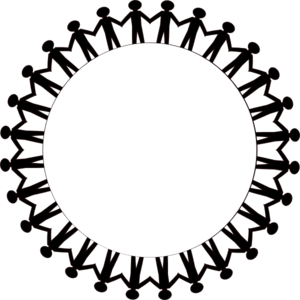MONTHLY BLOG 89, AS THE LANGUAGE OF ‘RACE’ DISAPPEARS, WHERE DOES THAT LEAVE THE ASSAULT UPON RACISM?
If citing, please kindly acknowledge copyright © Penelope J. Corfield (2018)

Hands around the Globe:
© WikiClipArt 2018
Many people, including myself, have declared that the language of ‘race’ should become obsolete.1 (Indeed, that is slowly happening). Talk of separate human ‘races’ is misleading terminology, since all humans belong to one species: homo sapiens. It’s unscientific, as geneticists have repeatedly shown that all people share the same deep biological inheritance and genome.2
Putting people into arbitrary ‘racial’ categories is also unjust to the many people with multiple ethnic heritages.3 And the terminology is confusing even for those who still believe in it, since there has never been agreement about fundamental questions, such as how many ‘races’ there are.
So this BLOG asks what is happening next, as the old terminology slowly disappears? For certain purposes societies need to acknowledge the range of diversity (alongside the common features) within the human species. Yet it is evident that the world has not yet agreed upon satisfactory alternative terminologies.
The first general answer is that language innovation will find a way. It’s not just for one individual to prescribe, but for usages to adapt incrementally. These days, references are usually made in terms of cultural ethnicity (or folk allegiance)4 and/or in terminologies derived from world-regional locations, or a mix of the same (as in African American).
Language innovation also needs to acknowledge the very many people around the world who have multiple inheritances. It’s not satisfactory to refer to ‘mixed race’ or ‘multi-racial backgrounds’. Those phrases smuggle the scientifically meaningless but culturally divisive concept of ‘race’ back into the picture. World regional terms have the advantage here, in that they can easily be doubled up to indicate multiple roots. However, mixings over many generations can make for cumbersome and overloaded terminologies. Often, new collective terms emerge over time. So the ancestrally hybrid Celtic/Viking/Anglo-Saxon/Norman-French population of England after 1066 became eventually ‘English’, and continue to adapt to later generations of population turnover.
One technical change that’s certainly needed is the updating of language on official forms, such as census returns. People are often still invited to self-classify into a separate ‘race’ by ticking a box. When scrutinised closely, such forms often use a very unsystematic mix of classifications, sometimes by ethnicity and sometimes by skin colour. People of multiple heritages usually have to make do with ticking ‘Other’. But sometimes they don’t even get that option. And people who reject the classification of humans into bogus ‘races’ don’t have anywhere to express their dissent.
Another key question is what happens to concepts like ‘racism’ and ‘racist’, if ‘race’ is dropped from the lexicon? Does that move let people who embrace racism off the hook?
To that pertinent question, the answer is: No. People who discriminate against other ethnic groups still need to be opposed just as firmly. But not by using their language. Rejecting the reality of ‘race’ strengthens criticism of racist prejudices. Such attitudes are not only humanly obnoxious but they are based upon non-sense: a combination of myths, pseudo-science, and a not very well disguised form of self-interest. Racists are the equivalent of flat-earthers, denying reality for their own tribalistic benefit.
En route, here’s a small point in the general scheme of things but a relevant one in this context: the United Nations should keep its International Day for the Elimination of ‘Racial’ Discrimination. It’s scheduled annually on 21 March – the anniversary of the Sharpeville killings of protestors against the infamous South American Pass Laws.5 Yet it needs a better name. Or at least ‘Racial’ in its title should be put into quotation marks, as I’ve just done. Otherwise, its subtext seems to affirm that there are separate ‘races’, when there aren’t. Indeed, one of the practical problems of implementing the South African Pass Laws sprang from the complexities of historic interminglings: many individual classifications into the stipulated camps of ‘White’ or ‘Native’ [black African] or ‘Coloured’ proved to be highly contentious.6
Following that, it’s also worth asking whether rejecting the concept of ‘race’ might imply that people shouldn’t take an interest in their own genetic and cultural/ethnic backgrounds? Here the answer is equally: No. But this time, the effect is positive. Rejecting ‘race’ liberates people from trying to fit their personal histories into false categories, which don’t exist.
Instead, individuals can investigate the ethnic identities of all their family branches with pride. Rejecting separate ‘races’ improves the potential for personal and cultural understanding of our pluralistic humanity. That’s particularly important for people from multiple heritages. Those historic legacies all merit attention, without any false rankings of one group being intrinsically ‘above’ another group of fellow humans. It’s culturally and psychologically important for people to know about their roots. (And in some cases it’s medically relevant too). Yet that exercise should be done in a democratic spirit. Pride in roots is not racist but a due acknowledgement of authentic pluralism.
In many countries, these themes are lived daily. For example, in the great ethnic melting pot of Brazil, there are rival pressures. On the one hand, there are subtle decodings of status and hierarchy by reference to an unacknowledged pigmentocracy, based upon skin colour. Lighter skinner people tend to be in positions of power, although not in all walks of life. On the other hand, there is great pride in country’s multicultural legacies. Hence there is a notable social impulse to ‘be cordial’ (in a favoured phrase) by not drawing attention to outward differences (say) in appearance and skin colour.7 Visitors report on a society where people seem admirably comfortable in their own bodies. In short, the collective dynamic may be evolving beyond older fixations upon ‘race’.
Nonetheless, Brazil’s current policies of affirmative action, to help disadvantaged groups, are running into major difficulties in classifying ethnic affiliations. Specifically, the ‘Race Tribunals’, appointed to undertake this delicate task for appointments to government posts, are struggling with the instability of ‘racial’ boundaries.8 Hence the policy, undertaken with good intentions, has already become controversial.
It may well be that in future the challenges to inequality, in Brazil as elsewhere, will turn to focus instead upon class. And ‘class’, whilst also a socio-cultural-economic concept with its own definitional fuzziness, does not purport to be pre-ordained by human biology. Achieving a full and fair democracy is no easy task; but it will be boosted by finding fresh terms for ethnic diversities within a common humanity – and fresh ways of both assessing and rectifying social disadvantage.
Lastly, the best egalitarian rejection of racism is not to urge that: ‘all “races” should be treated equally’. Such a declaration falls back into the trap of racist pseudo-science. The best statement is straightforward: ‘We are all one human race’. That’s the seriously best starting point from which to combat discrimination.
1 P.J. Corfield, See P.J. Corfield, Talking of Language, It’s Time to Update the Language of Race (BLOG/36, Dec. 2013); idem, How do People Respond to Eliminating the Language of ‘Race’? (BLOG/37, Jan.2014); and idem, Why is the Language of ‘Race’ Holding On for So Long, when it’s Based on a Pseudo-Science? (BLOG/38, Feb. 2014).
2 See L.L. and F. Cavalli-Sforza, The Great Human Diasporas: The History of Diversity and Evolution, transl. S. Thomas (Reading, Mass., 1992); and M. Gannon, ‘Race is a Social Construct, Scientists Argue’, Scientific American (5 Feb. 2016), with the strap line: ‘Racial categories are weak proxies for genetic diversity and need to be phased out’.
3 See M.P.P. Root’s Bill of Rights for People of Mixed Heritage (1993), www.drmariaroot.com/doc/BillOfRights.pdf: which includes the declaration: ‘I have the right to have loyalties and identification with more than one group of people’.
4 Ethnicity is defined as the state of belonging to a distinctive group with a shared cultural and/or national tradition. Shared religion, language and genetic markers may also contribute. The classification is not a precise one.
5 www.un.org/en/events/racialdiscriminationday.
6 D. Posel, Race as Common Sense: Racial Classification in Twentieth-Century South Africa’, African Studies Review, 44 (2001), pp. 87-113.
7 J. Roth-Gordon, Race and the Brazilian Body: Blackness, Whiteness, and Everyday Language in Rio de Janeiro (2016).
8 C. de Oliveira, ‘Brazil’s New Problem with Blackness’ (2017), in Foreign Policy Dispatch: http://foreignpolicy.com/2017/04/05/brazils-new-problem-with-blackness-affirmative-action/
For further discussion, see Twitter
To read other discussion-points, please click here
To download Monthly Blog 89 please click here









